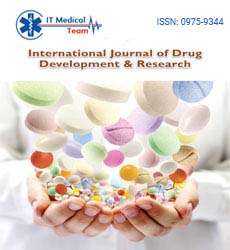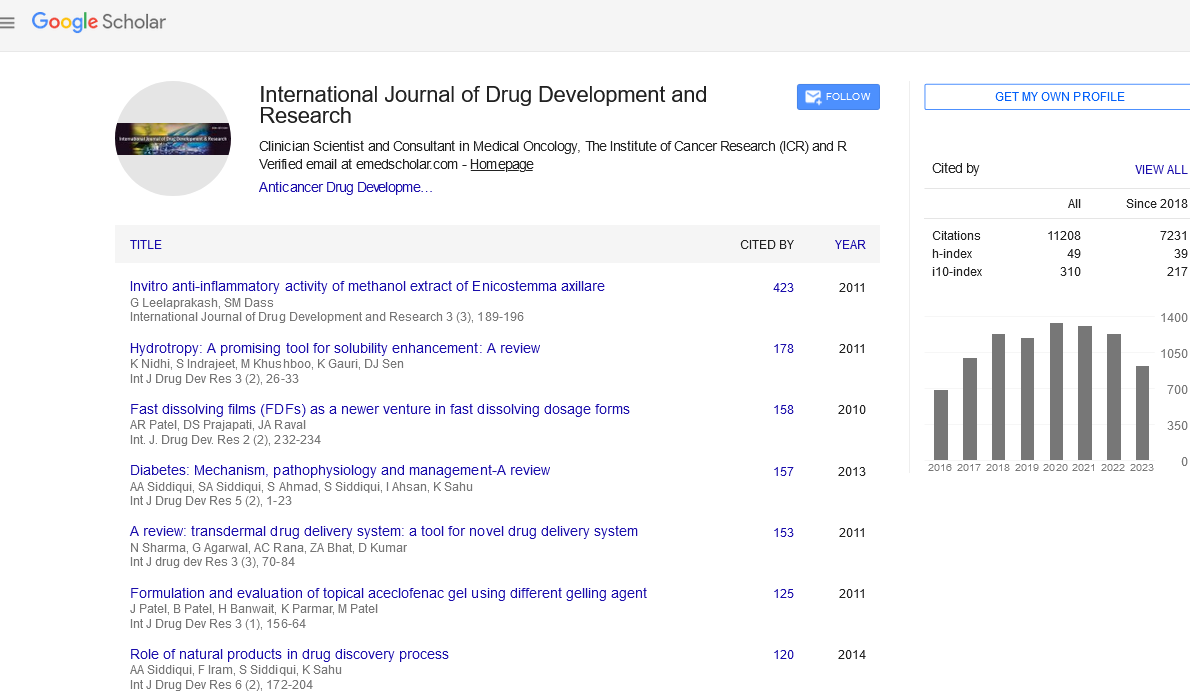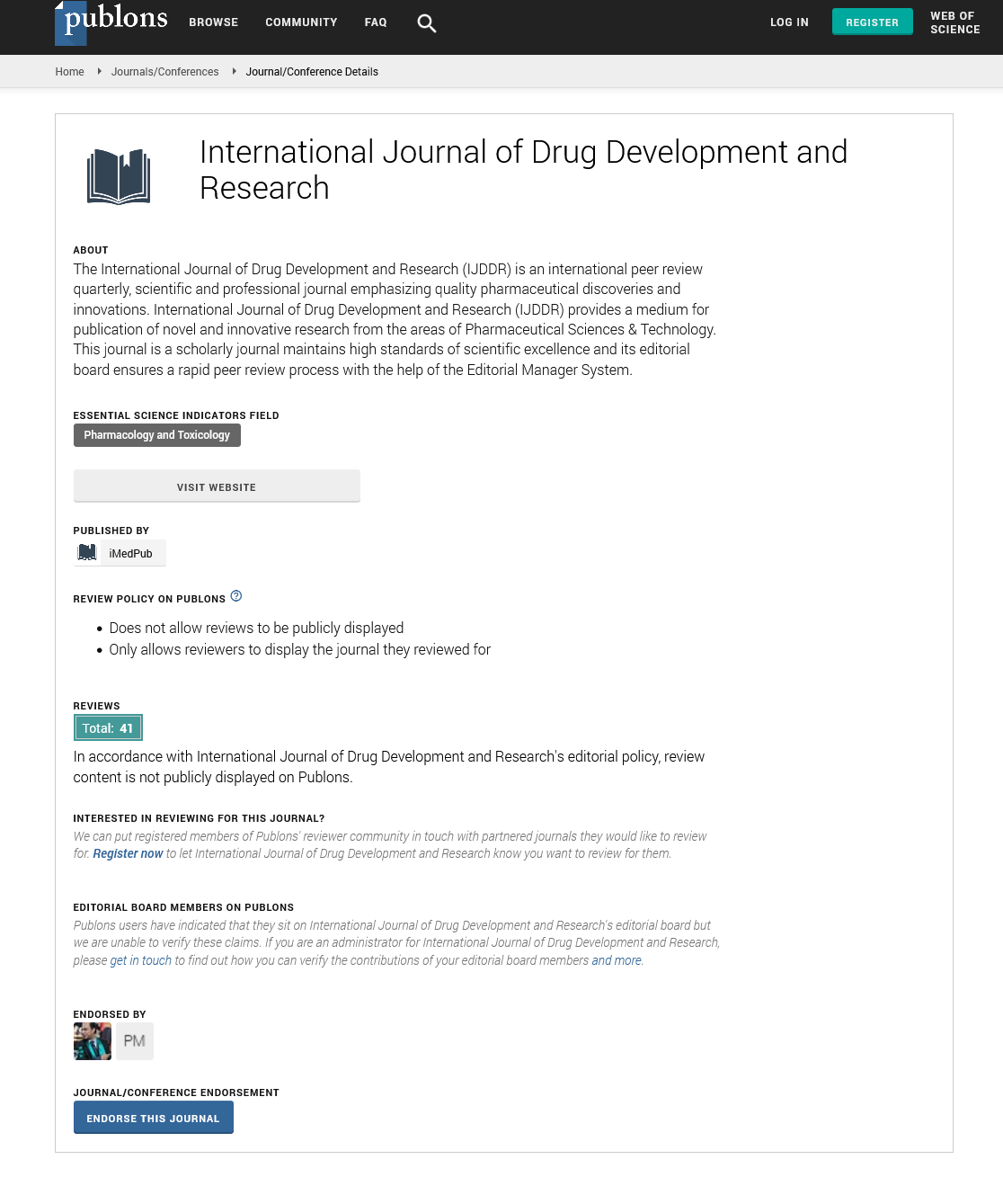Keywords
|
| Aceclofenac, Ethyl Cellulose, Eudragit RSPO, Aerosil, Micro particles. |
Introduction
|
| Osteoarthritis, rheumatoid arthritis and ankylosing spondylities are a group of related, but distinct, disorders of the cartilage of Osteoarthritis predominantly affects the large weight-bearing joints and the clinical characteristics include morning stiffness of short duration, stiffness or gelling on rest, |
| pain on use, joint debilitating, Fatigue, malaise, subcutaneous nodules and fever are common systemic symptoms of Rheumatoid Arthritis, Ankylosing spondylitis is characterized by inflammation, predominantly of the spine, but in some cases, also of the large peripheral joints. Systemic symptoms can include fever, fatigue and anorexia and in some cases pericarditis and pleuritis may occur.NSAIDs have become widely used in the treatment of these illnesses for their pain-relieving and anti-inflammatory properties [1]. Since long-term NSAIDs treatment is indicated for osteoarthritis, the ideal agent should have good efficacy and a low propensity to cause adverse events.Aceclofenac appears to be particularly well tolerated among the NSAIDs, with a lower incidence of gastrointestinal adverse effects, This good tolerability profile results in a reduced withdrawal rate and grater compliance with treatment[2]. Aceclofenac is a phenyl acetic acid derivative related to diclofenac. It is practically insoluble in water drug with a molecular weight of 354.19, a pKa value of 4.7 and a log p-value of 1.23. It is a potent analgesic, anti-pyretic and antiinflammatory agent used in the management of moderate-to-severe pain and in rheumatic disorders such as rheumatoid arthritis and ankylosing spondylities [3]. Aceclofenac is probably metabolized via Cytochrome P450 2C9 to the main metabolite 4- hydroxyacefenac with negligible contribution to clinical activity. |
| Micro particles are one of the multiparticulate delivery systems and are prepared to obtain prolonged or controlled drug delivery, to improve bioavailability or stability and to target to specific sites [4].They can distribute in the GI tract homogeneously, thus maximizing drug absorption and reducing peak plasma fluctuations, minimizing the risk of local GI tract irritation and dose dumping, decreasing dosing frequency and increasing patient compliance, improving the safety and efficacy of the active ingredient [5]. |
| Preformulation commences when a new method development shows sufficient pharmacologic promise in animal models to warrants evaluation in man [6]. These studies should focus on those physicochemical properties of the compound that could affect drug performance and development of an efficacious dosage form. A thorough understanding of these properties may ultimately provide a rational for formulation design, or support the need for product development and furnished the marketed research. |
| The aim of this study was to determine some of the physicochemical properties such as solubility, pKa, dissolution, melting point and assay development, stability in solid state, bulk density, flow properties, excipient compatibility, entrapment efficiency and release profile of micro particles. |
Materials and Methods
|
| Aceclofenac was purchased from Sigma Chemical Co., Mumbai, India. ethyl cellulose (EC) (ethoxy content: 48-49.5% w/w, viscosity:18-22cps) was obtained from Loba chemie pvt Ltd, (Mumbai, India) Eudragit RSPO were received as gift samples from Evonik Degussa Industries, Mumbai, Dichloromethane (DCM) AR, Acetone AR, Acetonitrile HPLC and tween 80 and sodium dodecyl sulphate(SDS) were from Qualigenas (Mumbai, India); sodium dihydrogen ortho phosphate AR, sodium chloride and sodium hydroxide were received from SD fine chemicals (Mumbai, India).. The HPLC grade water was prepared by using Milli-Q Academic, Millipore, and Bangalore, India. A Remi mechanical stirrer (Remi Motors, India) was used for the preparation of the micro particles. Shimadzu (Tokyo, Japan) model which consisted of a LC10AD and LC10 ADvp solvent delivery module, SPD 20 PDA detector, a Rheodyne injector (model 7125, USA) valve fitted with a 25 μl loop, and PDA detector (SPD-20). The system was controlled through a system controller (SCL-10A) and a personal computer using a Shimadzu chromatographic software (LC Solution, Release 1.11SP1) installed on it was used for the assay of Aceclofenac. All other reagents used were of analytical grade |
Experimental Studies
|
|
Determination of solubility
|
| The aceclofenac sodium was evaluated for solubility in acetone, methanol, diethyl ether chloroform and ethanol in accordance with the British pharmacopoeia specifications [7]. |
pH Determination
|
| This was done by shaking a 1%w/v dispersion of the sample in water for 5min and the pH determination using a digital pH meter(model 335, Systronics, India)[8,9]. The data presented here is for triplicate determinations. |
|
True density
|
| True density of aceclofenac was determined by liquid displacement method. It is calculated from the volume of intrusion fluid (toluene) displaced in the pycnometer by a given mass of powder [10]. |
 |
| Where, D is true density, Vp is the total volume of the pycnometer and Vi is the volume of intrusion fluid in the pycnometer containing the mass of powder (M). All the estimations were done in triplicate and average are reported in table 1. |
Determination of bulk density, bulkiness and compressibility index
|
| The bulk density of aceclofenac was determined by the three tap method [11, 12]. 10g of aceclofenac powder was carefully introduced into a 100 ml graduated cylinder. The cylinder was dropped onto a hard wood surface 3 times from a height of 1inch at an interval of 2 seconds. The bulk density was obtained by dividing the weight of the sample by volume of the sample contained in the cylinder. Reciprocal of bulk density or the specific bulk volume gave the bulkiness. The percent compressibility index (I) [13] of the aceclofenac was calculated using following formula and the results are given in Table 1. |
 |
|
Angle of repose
|
| The static angle of repose, a, was measured according to the fixed funnel and free standing cone method [14] a funnel was clamped with its tip 2cm above a graph paper placed on a flat horizontal surface. The powders were carefully poured through the funnel until the apex of the cone thus formed just reached the tip of the funnel. The mean diameters of the base of the powder cones were determined and the tangent of the angle of repose calculated using the equation: |
 |
| The data presented here is for triplicate |
| determinations. |
Determination of Partition Coefficient
|
| 10 mg drug was added in 50 ml of n-Octanol (pre saturated with water) and it was shaked and then 50 ml of distilled water (pre saturated with n- Octanol) was added and was shaked the mixture by mechanical shaker for 24 hours. After 24 hour both phases are separated. Absorbance was taken of both the phases and calculated the concentration in each phases [15]. |
 |
|
Percentage of moisture loss
|
| The drug loaded microspheres were evaluated for percentage of moisture loss which sharing an idea about its hydrophilic nature. The microspheres weighed initially and kept in desiccator containing calcium chloride at 37 °C for 24 hours. When no further change in weight of sample was observed, the final weight was noted down [16]. |
 |
|
Method for the Estimation of Aceclofenac
|
| A spectrophotometric based on the measurement of absorbance at 275nm in phosphate buffer of pH 7.4 was used in the present study for the estimation aceclofenac [17, 18]. |
|
Standard solution
|
| 100mg of aceclofenac was dissolved in methanol in a volumetric flask and the solution was made up to volume with methanol. |
|
Procedure
|
| The Standard solution of aceclofenac was subsequently diluted with phosphate buffer of pH7.4 to obtain a series of dilutions containing 5,10,15,20 and 25μ of aceclofenac in 1ml solution. The absorbance of these solutions was measured in shimadzu-UV Pharmaspec1700, UV-Vis Spectrophotometer at 275nm using phosphate buffer of pH 7.4 as blank. The concentration of aceclofenac and the corresponding absorbance as show in figure- 1. |
|
Validation of the Method
|
| Reproducibility of the above method was studied by analyzing six individually weighed sample of aceclofenac. The percent standard deviation (SD) of the determination found to be less than 1.0%. |
|
Interference study
|
| The interference in the above method by the excipient used in the present investigation was studied by testing their effects individually [19]. Accurately weight amount of aceclofenac and excipients in 1:1 ratio were mixed thoroughly. From each mixture, accurately weight power equivalent to 100mg of aceclofenac was assayed by the method described above. The aceclofenac content were calculated using the calibration curve (figure 1) and the results are given in table 2. |
|
Marketed product Evaluation
|
| Three commercially marketed brands of modified release Aceclofenac tablets were selected to study the quality of tablets. |
|
Assessment of viscosity of oil phase
|
| The viscosities of oil phase were evaluated using an Ostwald viscometer at room temperature (30 ± 2?C). The absolute viscosities of that solution were expressed in mpa.s [20]. |
Preparation of Aceclofenac loaded Micro particles
|
| Emulsion-solvent-evaporation technique [13, 21] with some modifications was used to prepare micro particles containing. Aceclofenac three different batches of micro particles were prepared, keeping Polymer to drug and dispersing agent ratio constant and varying the ratio of organic phase to oil phase and composition of oil phase Table 5. Ethyl cellulose and Aceclofenac were dissolved in oil phase (2%,4% w/v EC dissolved in DCM- acetone containing Aerosil 2 % dissolved in DCM-acetone containing, this solution was dispersed in aqueous phase (purified water containing 0.08 % w/v tween 80) and agitated at 800 rpm for 1 hour using a medium duty mechanical stirrer (Universal motor Type-ROT-134H, Mumbai, India). |
| Same technique followed by this formulations [22] Eudragit RSPO and Aceclofenac were dissolved in oil phase (1%, 3% w/v Eudragit RSPO dissolved in DCMacetone containing 3% Aerosil); this solution was dispersed in aqueous phase (purified water containing 0.08% w/w SDS) and agitated at 600 rpm for1 hour using a medium duty mechanical stirrer for optimized temperature control (16?C to 28?C). The micro particles were recovered by filtration, washed with distilled water, air dried and stored in a desiccators containing fused calcium chloride as desiccators. |
|
Percentage yield
|
| The dried micro particles were weighed and percentage yield of the prepared micro particles was calculated by using the following formula [23]. The results are given in Table 7 |
 |
|
Scanning electron microscopy (SEM)
|
| The formulated micro particles were taken for the shape and surface characteristic studies. The micro particle were scanned using scanning Electron microscopy, the micro particles were mounted directly on to the scanning Electron Microscopy samples stub using double sided sticking tape, coated with gold in quick auto coater, with a thickness of 200 nm under reduced pressure of 0.001 torr.The shape and surface characteristic of the micro particles were observed in Electron microanalyserand photographs were taken using JSM 6400 camera Fig.4 |
|
Particle Size Analysis of Micro particles
|
| Average particle diameter and size distribution of micro particles were determined by laser diffractometry using a Mastersizer 2000 (Malvern Instruments, Malvern, UK). Approximately 10 mg of micro particles were dispersed in 2 to 3 ml distilled water containing 0.1% Nonidet P40 for several minutes using an ultrasonic bath. Then, an aliquot of the micro particles suspension was added into the small volume recirculation unit [24], which was subsequently circulated 3500 times per minute. Each sample was measured in triplicate for the analysis. Particle size was expressed as the weighted mean of the volume distribution. The results are given in Table 6 and shown in Figure 5. |
|
Encapsulation efficiency (EE)
|
| Drug loaded micro particles (50 mg) were powdered and suspended in water and then sonicated for about 20 minutes. It was shaken for another 20 minutes for the complete extraction of drug from the micro particles [25]. The mixture was filtered through a 0.45 μm membrane filter (MILLIPORE). Drug content was determined by UV- visible spectrophotometer (UV – 160IPC, Shimadzu, Japan) at 275 nm. The percent entrapment was calculated using the following formula. The results are given in Table 7, |
 |
|
Drug release study
|
| In vitro release study of Aceclofenac micro particles was carried out in 900ml of 0.1N HCL used for 2hrs and then followed by phosphate buffer (pH 7.4) maintained at 37±0.5ºC, with stirring speed 100rpm, using auto sampling US dissolution apparatus type 1(rotating basket) [DS8000 Disso Sr.No:0826533 Lab India]. Micro particles, equivalent to 50 mg of Aceclofenac were used for the study. 10 ml samples were withdrawn at predetermined time intervals, filtered through a 0.45μm membrane filter, diluted suitably and analyzed using a UV spectrophotometer at 275nm [26]. |
|
Stability studies
|
| The micro particles was taken in a crucible and placed at 450C and 75%RH for 60 days, the Micro particles were analyzed for their drug content and dissolution studies [27]. |
Results and Discussion
|
| Particle size distribution of drug has influence on many bulk properties of pharmaceutical interest such as flow properties, packing densities, compressibility segregation characteristics etc. The results of solubility, true density, bulk density, compressibility index, angle of repose, moisture content, pH, Partition Coefficient are given in Table 1.The micro particle had good spherical geometry as evidenced by the SEM photographs. The surface of the micro particles was quite smooth in figure 4. |
| The results of particle size distribution in figure 5 represent the following (a) AECAM1, (b) AECAM2, (C)AEUAM3, (D) AEUAM4 .Measured in a Malvern particle sizer. Mean particle size was found to be ethyl cellulose micro particles a range between 444- 636μm and Eudragit RSPO micro particles as least size 196-319μm given in table 6. Surface morphology of all the formulation was found to be smooth. |
| Entrapment efficiency and Percentage yield of the formulated micro particles of ethyl cellulose was found to be high 82-86% followed by 78% - 80% for Eudragit RSPO.Entrapment efficiency were found to be high for all the four formulation 76% -79% [AECAM] & 73% -77% [AEUAM]. |
| Aceclofenac loaded micro particles were successfully prepared by emulsion solvent evaporation method using ethyl cellulose, Eudragit RSPO and as a dispersion carrier aerosil to extend the period of drug release by retarding the release rate.Invitro drug release of formulated sustained release micro particles are give n in table 7. The cumulative percentage of drug release for the micro particles after12hrs at phosphate buffer pH7.4 were found to be AECAM191%, for AECAM294%, for AEUAM384%,and AEUAM4 88% in figure3.These high percentage of release after the 12 hours could be due to the lower amount of polymer concentration added in the present formulation. Three brands were chosen in order to study the quality of the marketed brands of modified release aceclofenac tablets. The evaluated brands within their shelf life during the time of the study. Uniformity of weight, Friability and Hardness were evaluated and these results were shown in Table 4 from the results obtained it was found that all the three parameters were found to be satisfactory. The invitro release of the tablets at 0.1N HCL for first 2hoursof all the three brands showed 10-12% for release and at the pH 7.4 phosphate buffers after 24 hours it was found to be 77.4% for Aceclo SR, 68.39% for Aceclan SR and Zerodol CR showed 78.44% in figure 2. |
| Aceclofenac Ethyl cellulose and Eudragit RSPO micro particles containing aerosil as dispersing agent could be prepared by an emulsion solvent evaporation technique by using drug and polymer solvent in various ratios. Ethyl cellulose and Eudragit RSPO was selected as polymer because it is non-toxic, biocompatible, good film former and a good retarding agent to control the release rate. Aerosil, an inert solid dispersing carrier, was included in the formulation to extend the period of drug release [28]. Aerosil act as a retardant by reducing porosity and thus drug permeability by virtue of its hydrophobic nature. The micro particles were found to be smooth and spherical in nature |
|
CONCLUSION
|
| The preformulation phase is a critical phase in establishing the properties of CDs that will allow suitable risk assessment for development. Typically it begins during the lead optimization phase, continues through predomination, and on into the early phases of development. Decisions made on the information generated during this phase can have a profound effect on the subsequent development of those compounds. Therefore, it is imperative that preformulation should be performed as carefully as possible to enable rational decisions to be made. The quantity and quality of the drugs can affect the data generated as well as the equipment available and the expertise of the personnel conducting the investigations. In this study was successfully completed the physicochemical characterization of aceclofenac Sodium properties like morphology, size, solubility, pH, Partition coefficient, Surface area flow property, drug content and release study. This knowledge can be useful in developing modified release formulations mainly per oral extended release formulation aceclofenac loaded micro particles. |
Conflict of Interest
|
| NIL |
Source of Support
|
| NONE |
Tables at a glance
|
 |
 |
 |
 |
| Table 1 |
Table 2 |
Table 3 |
Table 4 |
 |
 |
 |
 |
| Table 6 |
Table 7 |
Table 8 |
Table 9 |
|
| |
Figures at a glance
|
 |
 |
 |
 |
 |
| Figure 1 |
Figure 2 |
Figure 3 |
Figure 4 |
Figure 5 |
|
| |


















